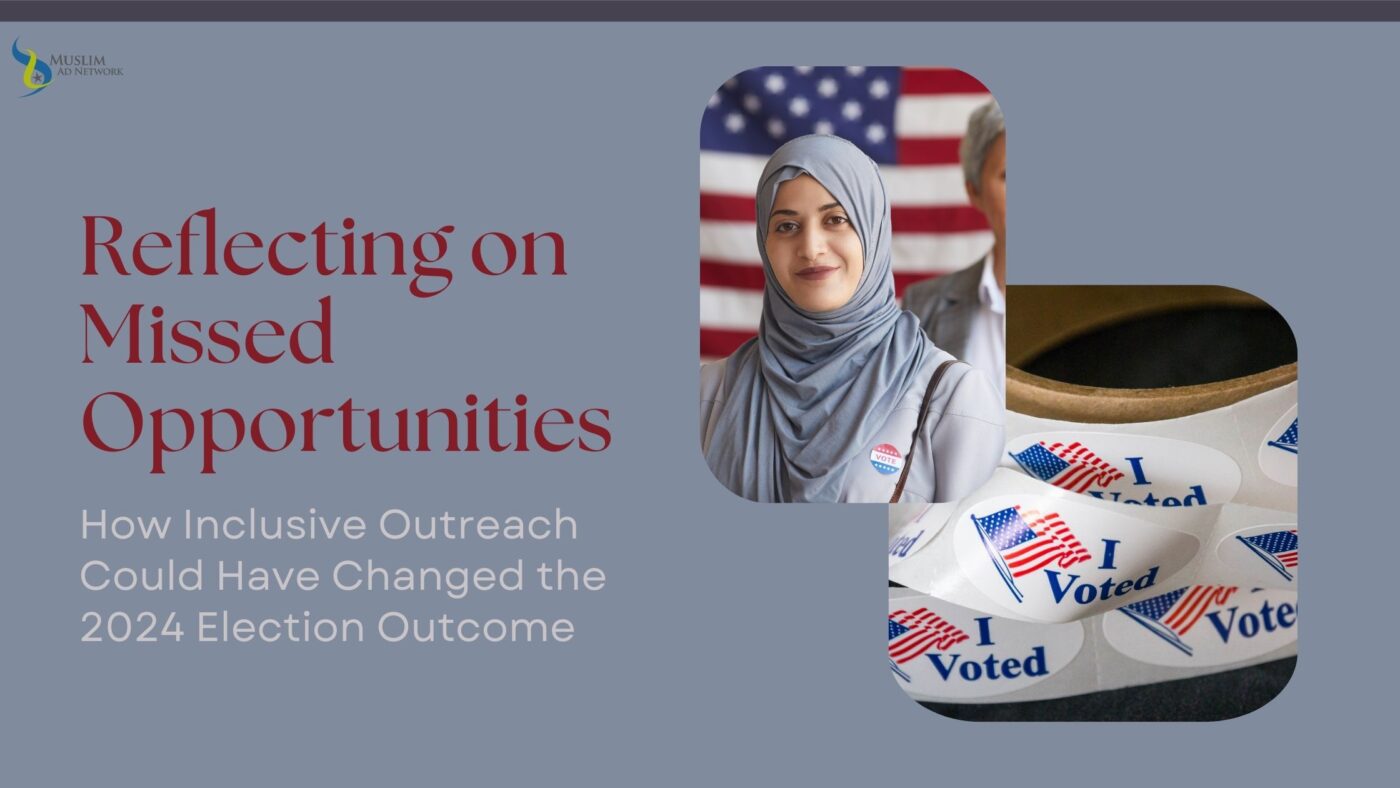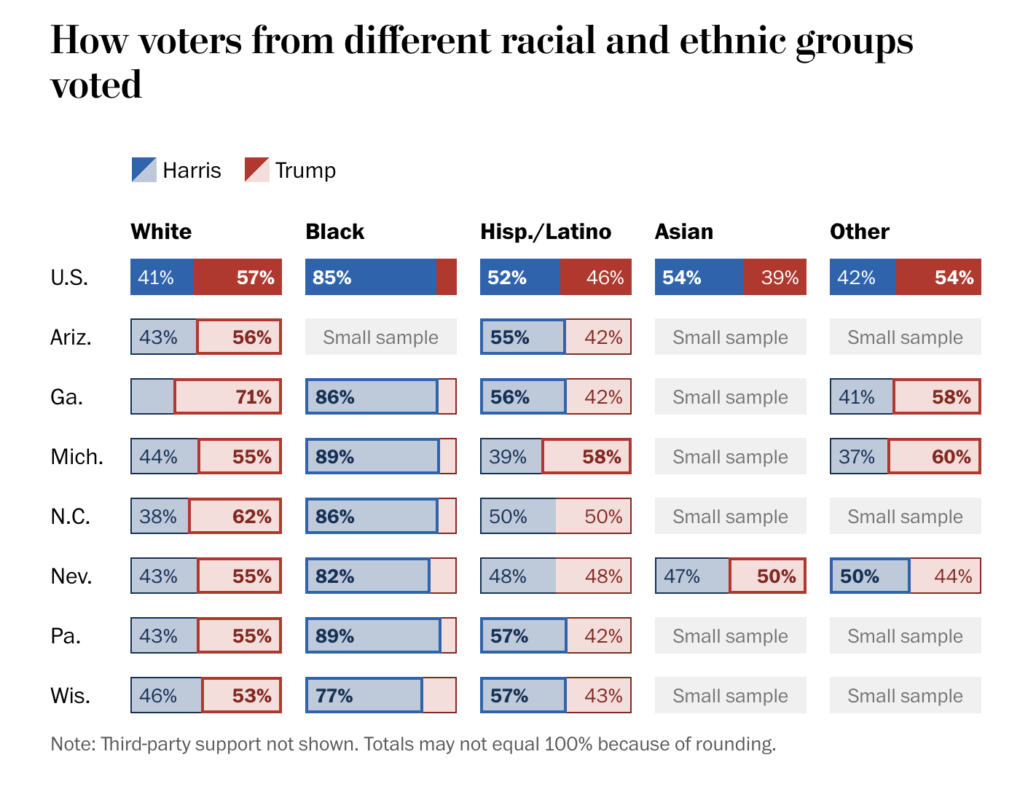
Key Takeaways:
- The Muslim Market is Booming: With a projected economic impact of $3.2 trillion by 2024, Muslim consumers are a rapidly growing audience, especially in industries like fashion, finance, and tech.
- Cultural Sensitivity is Key: Brands that resonate prioritize authenticity, avoiding stereotypes and creating campaigns around key Islamic dates like Ramadan and Eid for higher engagement.
- Mobile and Social Media First: Muslim consumers, especially younger ones, are highly active on mobile and social platforms like Instagram and TikTok, making mobile-first, social-centric strategies essential for reaching this audience.
In the aftermath of the 2024 U.S. presidential election, the analysis of voting patterns reveals a stark reality: white voters constituted the majority, while representation from ethnic minority groups, including Arab and Muslim voters, fell below expected levels. This disparity, highlighted in recent exit polls from The Washington Post (link), underscores a significant gap in the Democratic campaign’s strategy and outreach.

Image Credit: Washington Post
The Power of the Ethnic Minority Vote
The 2024 election emphasized a recurring issue: underestimating or taking for granted the votes of minority communities can have profound consequences. Reports from UnHerd (link) and insights from The New York Times (link) suggest that Kamala Harris’s campaign may have relied too heavily on assumed loyalty from ethnic minority voters, without sufficiently engaging these groups on issues that resonate with them. This oversight contributed to a drop in turnout among these communities, despite their potential to tip the scales in tightly contested states.
The Data Tells a Clear Story
Exit polls indicate that white voters were the predominant participants in the 2024 election. This reinforced their pivotal role in the outcome, while lower turnout rates among Muslim and Arab voters, along with other ethnic minorities, showed a disconnect between the Democratic platform and the concerns of these groups (France24). Cracks in the anti-Trump coalition became evident, as the campaign failed to mobilize certain demographics that had previously been crucial to Democratic successes.
Could It Have Made a Difference?
Given that many battleground states were decided by narrow margins, increased participation from underrepresented voters could have been transformative. The numbers suggest that targeted outreach—showing genuine commitment to issues affecting Muslim, Arab, and other minority communities—might have shifted enough support to impact the final results. As noted by The New York Times (link), a more robust engagement strategy could have prevented key losses that hinged on small vote differentials.
Lessons for the Future
The 2024 election underscores a critical takeaway for future campaigns: inclusive and culturally attuned outreach must be at the core of any strategy aiming to mobilize underrepresented communities, such as Muslim voters. This election served as a stark reminder that reliance on assumed loyalty or surface-level engagement is insufficient. To build trust and active support, candidates must adopt a comprehensive approach that resonates deeply with these communities.
Key Lessons for Democratic Candidates:
- Prioritize Authentic Engagement: Campaigns need to show genuine interest in the issues that matter most to Muslim and Arab communities. This involves listening, collaborating with local and religious leaders, and aligning campaign promises with the cultural and social values of these voters. As outlined in our strategic approach, authenticity is key in building lasting trust.
- Develop Culturally Relevant Messaging: Campaigns must communicate in a way that cuts through the noise and speaks directly to the Muslim community’s lived experiences. This requires crafting messages that reflect their concerns, from domestic policies to international issues affecting the Muslim world. Campaigns that ignore these aspects risk appearing out of touch, leading to disengagement.
- Leverage Targeted Media Platforms: Utilizing media platforms that have strong connections with the Muslim community, such as Muslim Ad Network, is essential. These platforms have the expertise to develop and distribute culturally sensitive and relevant content, ensuring that campaign messages are seen by the right audiences. By integrating the services of Muslim Ad Network, candidates can effectively reach Muslim voters through tailored ads that resonate with their values and beliefs.
- Partner with Grassroots Organizations: Strong partnerships with local and national Muslim organizations can help amplify voter mobilization efforts. These organizations have the trust of the community and can be instrumental in boosting turnout through community events, voter education, and advocacy.
Mobilize Your Outreach Strategy
To truly harness the potential of the Muslim vote in future elections, campaigns must commit to these lessons and strategies. For Democratic candidates seeking to strengthen their outreach and ensure no community is overlooked, using targeted solutions like those provided by Muslim Ad Network is a powerful step forward. With culturally relevant advertising and in-depth knowledge of the Muslim consumer base, campaigns can craft impactful and persuasive messaging that motivates action.
In conclusion, the 2024 election provides valuable lessons for those aiming to mobilize the Muslim community: address their concerns, communicate effectively, and partner with organizations that understand their needs. By doing so, Muslim voters can play a pivotal role in shaping election outcomes. Remember, for those participating, your vote is a form of ijtihaad—an effort towards what you believe is right.
As the Quran (3:26) reminds us:
“Say: ‘O Allah! Lord of Power (And Rule), Thou givest power to whom Thou pleasest, and Thou strippest off power from whom Thou pleasest: Thou enduest with honour whom Thou pleasest, and Thou bringest low whom Thou pleasest: In Thy hand is all good. Verily, over all things Thou hast power.'”
This is a reminder that while we do our part, the outcome is ultimately in the hands of Allah SWT.
